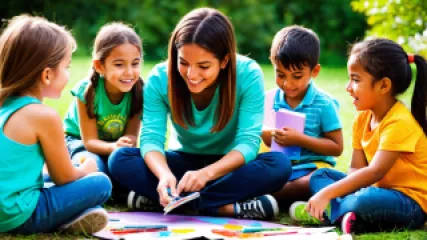Fostering Resilience in Young Children: A Step-by-Step Guide
Resilience is an essential skill that helps individuals navigate through life's challenges and setbacks. It is particularly important for young children as they develop the ability to cope with adversity and bounce back from difficult situations. By fostering resilience in young children, parents, caregivers, and educators can equip them with the tools and mindset needed to thrive in the face of adversity.
Why is childhood resilience building important?
Childhood resilience building is crucial because it sets the foundation for a child's emotional well-being and mental health throughout their lives. Resilient children are better equipped to handle stress, adapt to change, and maintain positive relationships. They have a greater sense of self-efficacy and are more likely to persevere when faced with challenges.
By teaching resilience to children, we empower them to take control of their emotions, thoughts, and actions. They learn to view setbacks as opportunities for growth and develop a problem-solving mindset. Building resilience in young children helps foster a sense of optimism and confidence, enabling them to face life's ups and downs with resilience and determination.
How to teach resilience to children: A step-by-step guide
1. Model resilience: Children learn by observing the behavior of adults around them. Show them how you handle challenges and setbacks with resilience and optimism. Be open about your own struggles and share how you overcome them.
2. Promote a growth mindset: Encourage children to embrace challenges and believe in their ability to learn and grow. Teach them that mistakes are opportunities for learning and that effort is essential for success. Praise their efforts and progress rather than focusing solely on outcomes.
3. Develop emotional intelligence: Help children identify and express their emotions. Teach them healthy coping strategies such as deep breathing, talking about their feelings, or engaging in creative activities. Encourage empathy by discussing how others may be feeling in different situations.
4. Build supportive relationships: Foster strong connections with family, friends, and other caring adults. Encourage children to seek support when they need it and teach them effective communication skills to express their needs and concerns.
5. Encourage problem-solving skills: Teach children how to break down problems into smaller, manageable steps. Encourage brainstorming and creative thinking to find possible solutions. Help them evaluate the pros and cons of each option and make informed decisions.
6. Promote self-care: Teach children the importance of self-care and self-compassion. Encourage them to engage in activities that bring them joy and relaxation. Teach them to prioritize their well-being and set healthy boundaries.
7. Emphasize perseverance: Teach children the value of persistence and resilience in achieving their goals. Encourage them to keep trying even when faced with obstacles. Highlight stories of individuals who have overcome challenges through perseverance.
8. Provide opportunities for independence: Gradually give children age-appropriate responsibilities and encourage them to take on new challenges. Allow them to make decisions and experience the consequences of their actions, fostering a sense of self-reliance and resilience.
9. Celebrate successes: Acknowledge and celebrate children's accomplishments, no matter how small. Recognize their efforts and progress, reinforcing their belief in their own abilities.
10. Cultivate a positive and nurturing environment: Create a safe and supportive environment where children feel valued, respected, and loved. Set clear expectations and boundaries while providing opportunities for exploration and creativity.
Childhood resilience activities
Engaging children in various activities can help foster resilience. Here are some ideas:
- Art therapy: Encourage children to express their emotions through drawing, painting, or other creative mediums.
- Outdoor play: Allow children to explore nature, play sports, or engage in physical activities that promote resilience and teamwork.
- Storytelling: Share stories that highlight resilience and inspire children to overcome challenges.
- Journaling: Encourage children to write about their thoughts, feelings, and experiences as a way to develop self-reflection and emotional awareness.
- Role-playing: Act out different scenarios with children to help them problem-solve and develop effective communication skills.
- Mindfulness exercises: Teach children simple mindfulness techniques such as deep breathing or body scans to help them manage stress and build resilience.
Remember that each child is unique, and what works for one may not work for another. Tailor activities based on their interests, age, and developmental stage.
Nurturing resilience in children: A lifelong journey
Building resilience in young children is an ongoing process that requires patience, consistency, and support from parents, caregivers, and educators. It is important to create a nurturing and empowering environment where children feel safe to explore, make mistakes, and learn from them.
By modeling resilience, teaching problem-solving skills, and promoting a growth mindset, we can equip young children with the tools they need to navigate life's challenges with confidence and resilience. Remember, fostering resilience in children is an investment in their future well-being and success.






